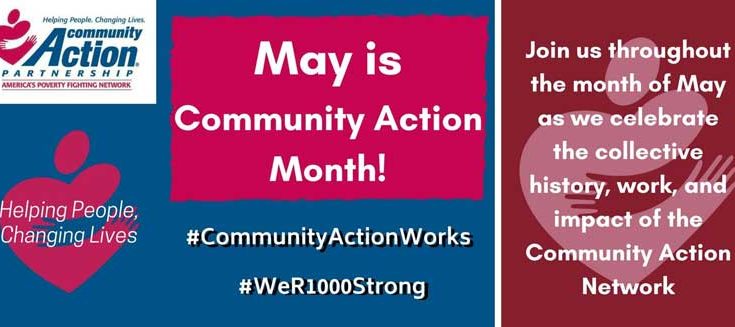Contributed Article
PHOENIX – Community Action programs across Arizona connect thousands of children and families to innovative, responsive programs and services that help lift them out of poverty toward self-sufficiency, transforming their lives and making communities stronger. May is National Community Action Month.
“Community Action makes a difference, not just during May, but every day,” said Cynthia Zwick, executive director of the Arizona Community Action Association. “May is a time when there’s a concerted effort nationwide to bring attention to the programs and the success stories generated by Community Action and to help communities understand what is working to help families thrive through programs that respond to ongoing needs and fill gaps across the state.”
Among the critical and successful programs by 11 Community Action Agencies in 15 Arizona counties that serve 232,217 individuals and families every year are:
- A food card program piloted by the Northern Arizona Council of Governments (NACOG). Originally created for seniors receiving food stamps who ran out of food, the program is now open to all income-verified eligible individuals who run out of food to receive the card valued at $30 four times a year for perishable food items. The program served 300 individuals the first year in 2014 and 900 in 2016 in Winslow, Pinetop, Prescott Valley, Cottonwood, Springerville, and Concho.
- Arizona@Work Northeastern Arizona that includes Gila County to keep individuals in the local area employed and paying taxes. The program, in partnership with Gila County Community Action Program, the Certified One-Stop Operator for the local area, can pay wages for work experiences for up to 12 months for opportunities that add work history to individual resumes, or reimburse employers up to half the wages for three months for a participant training for a job.
- A Pilot Program developed by the Western Arizona Council of Governments (WACOG) to prevent a crisis experienced by seniors who can’t afford to pay their utility bills during the hot summer months and, as a result, have to make choices about what they pay for: food medicine or utility bills. The program provides financial counseling and utility assistance paid to the utility vendor for qualifying seniors, a population that doesn’t generally ask for help. Seniors can apply in the fall for the program that runs from February to May to better manage their budgets and avoid a financial crisis when the heat hits.
- An Individual Development Account developed by the Coconino County Community Action Agency requiring individuals to complete a financial literacy program as part of the program criteria enabling low-income families to save a targeted amount of money to purchase and build assets including post-secondary education and small business ownership.
- A Dislocated Worker Program through Pima Community Services, Employment & Training Department (PCCSET) for individuals who need to upgrade their skills or retrain completely after being terminated, laid off or notified of a pending termination and who are eligible for or have exhausted unemployment insurance benefits. The program, in partnership with the Community Action Agency, provides participants with utility, rental or mortgage assistance and other services to maintain stability while they work towards achieving their training and employment goals. The program also trains older youth and adults who may be out of work because of general economic conditions in the community including displaced homemakers no longer supported by another family member.
- A Permanent Supportive Housing Program through the City of Phoenix Community Action Program that provides wrap-around case management services to help chronically homeless individuals and families who have received city housing vouchers to remain housed.
- MesaCAN’s Personal Investment Center, a one-stop-shop offering Mesa residents a range of services to move out of poverty through education, employment, and financial management. The program, which began in 2014, has worked with 2,000 unduplicated clients every year since.
“These programs represent every-day efforts to find solutions that improve lives,” Zwick said.
Community Action is funded through Federal Community Service Block Grants (CSBG). Among the vulnerable populations assisted in Arizona with CSBG funding were 67,068 children, 32,317 people with disabilities, 25,780 people who lacked health insurance and 24,114 seniors.
CSBG-funded programs in Arizona produced results showing that:
- 41,703 low-income individuals reduced or eliminated barriers to initial or continuous employment, found a job, increased their income or achieved “living wage” employment and benefits.
- 58,110 vulnerable, low-income individuals received services and secured or maintained an independent living situation as a result.
- 26,144 households with low incomes increased their financial assets or financial skills.
- 207,427 individuals and families with low incomes received emergency assistance from the Community Action network.
Nearly 85 percent of families served by the Community Action network in Arizona live below 100% of Federal Poverty Guidelines and 35 percent of families served in Arizona are in severe poverty, living below 50 percent of the Federal Poverty Guidelines.
Nationally, according to the National Association for State Community Service Programs (NASCSP) 2016 annual report, the CSBG network provided services that reduced or eliminated barriers to family stability by assisting 48,923 participants to enroll their children in before or after-school programs. The NASCSP annual report also reported that 165,530 low-income individuals in Community Action employment initiatives got a job or became self-employed.
For more information about Community Action, visit www.azcaa.orgcommunity-action-agencies.







